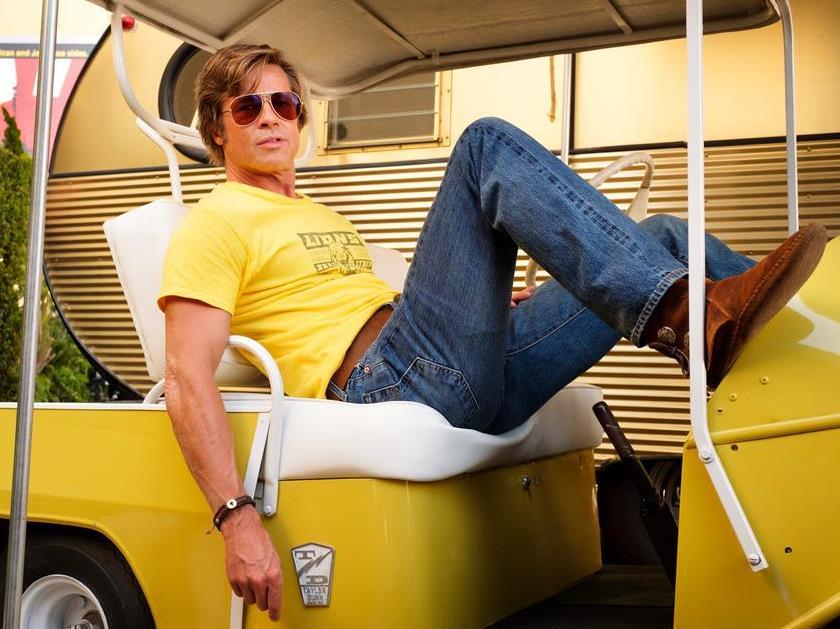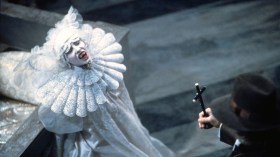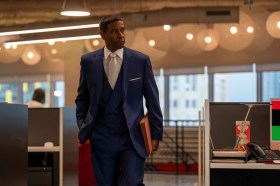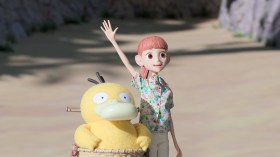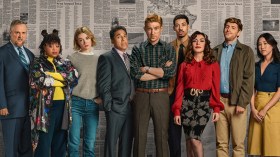Brad Pitt plays an all-American good guy with just enough shadow to be interesting. Image courtesy of Sony Pictures.
More often than not Quentin Tarantino’s films are seen as slices of pure genre entertainment. Forget politics and society; he’s all about cool moments and exploitative violence. It’s not a view that really stands up to close examination, especially with his 21st century output – was it just a coincidence that he made the World War II movie Inglourious Basterds after almost a decade of conflict in the Middle East – but with Once Upon a Time… in Hollywood it’s a view even casual critics can’t sustain. An almost plotless wander through a gorgeously rendered 1969 Hollywood, it’s the kind of film that definitely seems to be about something. But what?
Rick Dalton (Leonardo DiCaprio) is an actor who peaked when he wasn’t paying attention. Formerly the star of TV western Bounty Law, his movie career never quite took off. Now he’s making guest appearances as the bad guy in a string of network dramas – a career path that agent Marvin Schwarz (Al Pacino) tells him is training audiences to see him as a loser. It’s a blow.
His best friend, stunt double and personal driver Cliff Booth (Brad Pitt) has no such worries, despite a career in even worse straits. He’s a charming, confident, all-American he-man, good in a fight and able to leap onto a roof to fix a TV antenna in… okay, three bounds, but it’s still impressive. He may not be going anywhere, but that’s because he’s happy right where he is – even when his driving around LA gradually draws him into the dark side of the city’s hippie culture in the form of the Manson Family.
And while Margot Robbie’s Sharon Tate doesn’t get a lot of dialogue, she’s the heart of this film, an often-dancing symbol of Hollywood’s tomorrow while Dalton and Booth are its slightly shabby yesterday. Her real-life murder twisted things down a darker path; this suggests what was lost with her murder wasn’t just the present, but the future as well.
Hang out films – where the point is to spend time with the characters and environment, rather than race through a plot or fire off action sequences – are harder to make than they look. The temptation is always to keep the characters bland and likable but that’s a trap; bland characters are boring and a boring hang-out movie is no movie at all.
Tarantino likes spending time with his characters, but he usually spices things up with cool moments and tense stand offs. While Hollywood is a more obviously “mature” (read: less sweary and brutal) film than much of his output, there’s still a crowd-pleasing amount of both style and suspense here. Booth is pretty much the coolest dude alive, and there’s a scene at the Spahn Ranch, Booth’s former stomping ground turned home base to the Manson cult, that’s as gripping as anything Tarantino’s done to date.
But it’s with the characters that Tarantino steps up: while his previous scripts were filled with plot twists and flashback reveals, here those levels of detail lie within his leads. There’s just enough backstory with Booth – a dead wife whose death might not have been an accident, fellow stunt people who don’t like his “creepy vibe”, the suggestion that he’s a war hero, which usually means killer – to cast a long shadow. And Dalton is a charmer, but he’s a drunk who’s starting to doubt his skills; while Booth finds himself in the Mansons’ world, Dalton’s battle is an internal one, as he tries to reconnect with his talent on the set of yet another forgotten TV western.
This is often surprisingly funny in a playful way, revelling in the textures of its setting and as much about celebrating the simple pleasures of sturdily made entertainment as meditating on age and the passing of an era. But Tarantino’s celebration of 1969 Hollywood isn’t simple nostalgia. The barrage of references – everyone has the radio on, packaging and signs are everywhere, these Hollywood insiders are always talking movies and the television is never off – aren’t just to say “remember this?” They create a world soaking in media, a world where everyone is navigating through an onslaught of advertising and entertainment.
This isn’t a yearning for 1969. Rather, this is showing us that 1969 isn’t that far from today, their worries the same as ours. The melancholy that runs through this film isn’t for a specific time and place; the world is always changing, and people who had it all can feel it slipping away. Hippies might be the threat, but there’s plenty of non-murderous youth here too. The sun might be out and the girls might be pretty, but society is moving on and any victories these men might grab will be hard-won and fleeting. They’re always playing the bad guy for a reason.
|
5 stars
|
★★★★★
|
Once Upon a Time… In Hollywood
Director: Quentin Tarantino
USA, 2019, 2hr 45min
Sony
MA 15+
Release date: 15 August
Actors:
Director:
Format:
Country:
Release:
